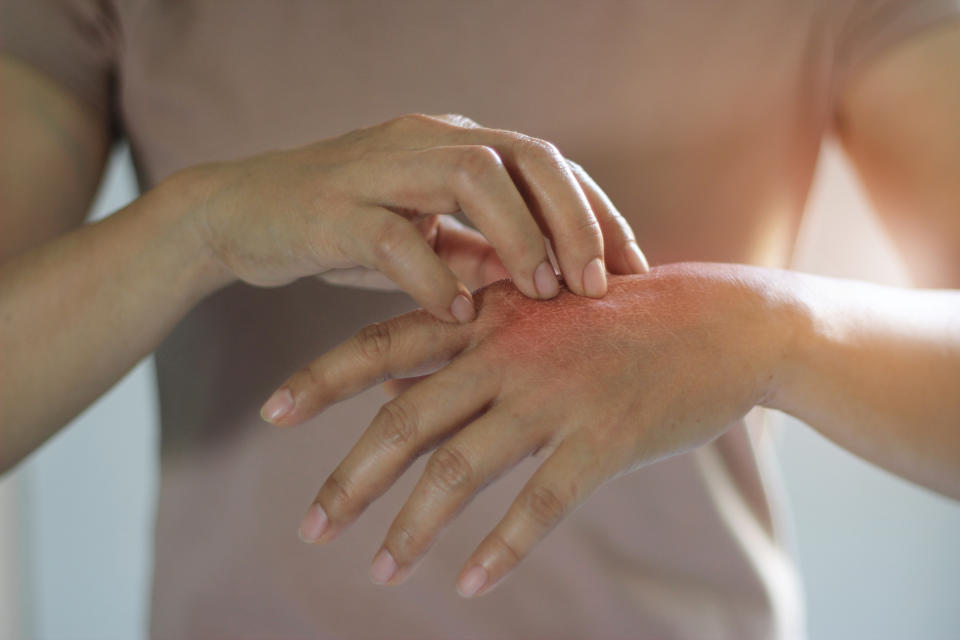Hope for millions with eczema after new vaccine 'halves symptoms in just one month'

An eczema vaccine could give hope to the millions who suffer from the painful skin condition, research suggests.
Scientists from the University of Oxford injected 12 patients with the drug etokimab, which targets the inflammatory protein IL-33.
After just one dose, all the participants saw their itchy, dry skin reduce in severity by at least half.
READ MORE: Why cases of adult eczema are on the rise – particularly in women
This significant symptom reduction continued at day 29 in 10 (83%) of the patients, the results show.
Experts have welcomed the study, calling the drug “hugely exciting” and the “future of treatment for severe eczema”.
Etokimab is now being tested in 300 patients. It is unclear when it may become available.

“This clinical trial is the first time we've looked at how blocking IL-33 can help patients with atopic dermatitis," lead author Professor Graham Ogg said.
"We have found they experienced significant improvement in their symptoms after a single dose."
Eczema, or atopic dermatitis, affects one in every five children in the UK to some extent, British Skin Foundation statistics show.
It is thought to be caused by “reduced barrier function” in the skin, combined with an overactive inflammatory and allergic response.
Exposure to anything from soap and dust mites to cigarette smoke and wool can trigger red, dry, itchy skin in a susceptible person.
Eczema has no cure. While creams help in mild cases, more severe patients may require stronger medication. Go-to drugs like ciclosporin and methotrexate can cause nausea.
READ MORE: Yes, you need a mattress cover: Here's why
To put etokimab to the test, the participants were first injected with a placebo solution, followed by the active vaccine one week later.
Four days after each jab, their left arm was injected with another placebo, while their right was exposed to a dust mite, which all the participants were allergic to.
The following day, blood and skin cell samples were collected from the site of the injection.
After the etokimab vaccine, the participants had 40% less eosinophils in their blood, the results show.
Normally released in response to an infection, eosinophils are immune-fighting cells that are often elevated in eczema sufferers, according to a paper in The Journal of Allergy and Clinical Immunology.
The secret to etokimab’s success may be that it is “exquisitely specific” in targeting IL-33, Professor Ogg said.
IL-33 is released in response to a suspected infection or damage. It then recruits immune-fighting cells to the area, triggering inflammation.
The results, published in the journal Science Translational Medicine, also suggest the vaccine was “generally well tolerated”.
READ MORE: National Eczema Week: 7 expert-approved solutions for adults, children and babies
The scientists were “surprised” by how effective the jab was and hope it will pave the way to new eczema treatments.
“We've been studying the role of IL-33 in human skin for nearly 10 years,” Professor Ogg said.
"We are pleased in this first human trial in patients with atopic dermatitis, we have confirmed the IL-33 pathway appears to be a therapeutic target in its own right.
"Doing experimental research in humans in crucially important if we are to make advances in treatment.”
Dr Emma Wedgeworth, consultant dermatologist and British Skin Foundation spokesperson, added: ‘There is no doubt in my mind targeted therapies like this are the future of treatment for severe eczema.”
She went on to say ‘the emergence of newer therapies” is “hugely exciting”.
Professor Patrick Chinnery, clinical director at the Medical Research Council - which part funded the study - also called the trial “exciting”.

